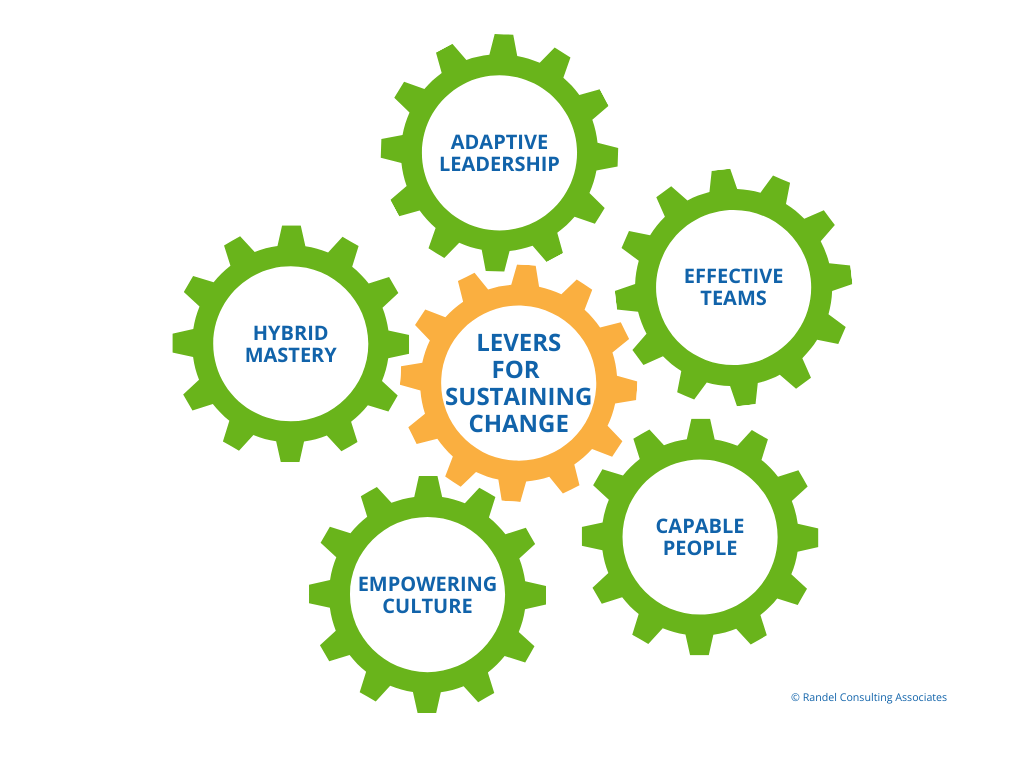The last few years have seen a transformation for organizations worldwide – the explosion of remote and hybrid work.
Looking into 2024, it’s clear that hybrid work has become the default mode of engagement for many companies. While some have embraced fully remote work, others have settled into a mix of in-office and remote days. Regardless of the specific model, one thing is certain – mastering hybrid work is critical to sustaining organizational growth and success.
One of the five Levers for Sustaining Change, Hybrid Mastery is, in its essence, the ability to thrive in a work environment in which some team members are present in the office while others operate remotely. The challenge lies in creating an effective and synergistic balance between these two settings.
#4. Hybrid Mastery
We see our clients grappling with several challenges as they seek their balancing point:
Lack of Clarity – Employees are uncertain about where best they are expected to work, and they are unclear about what their roles entail in this new setup.
Resistance to Change – Senior leaders, accustomed to traditional in-office work, may resist the transition to hybrid models. They may be skeptical of the benefits and reluctant to embrace new ways of working.
Ineffective Leadership – Managers struggle to effectively lead and coordinate teams in a hybrid environment. They may have difficulty maintaining team cohesion, providing guidance, or managing performance across remote and in-person team members.
Siloed Departments – The absence of in-person interaction and an overreliance on scheduled virtual meetings deepen silos within departments and teams. This leads to reduced collaboration, creativity, and problem-solving.
Low Employee Engagement – Cumulatively, these challenges contribute to low employee engagement. Employees may feel disconnected, undervalued, and uncertain about their future within the organization, leading to higher turnover rates.
The Four Solutions to Hybrid Mastery
To overcome these challenges and successfully navigate the challenges of hybrid work, we recommend that leaders embrace four essential solutions.
1..Equip People with the Skills, Tools, and Processes
Organizations should invest in comprehensive training that enhances employees’ proficiency with virtual collaboration tools and remote work best practices. This might include providing workshops and access to cutting-edge software.
2. Support Managers in Developing Hybrid Leadership
Managers need specialized support tailored to the demands of hybrid leadership. This can include effective remote team management, fostering a collaborative virtual culture, and providing virtual coaching and mentoring. Moreover, managers must learn to balance in-person and remote interactions strategically.
3. Re-contract with People to Focus on Results, Not Activity
Shift the focus of performance evaluations, from monitoring the hours spent at a desk to measuring outcomes and results. Employees should have clear, outcome-based goals that emphasize their contributions to the organization’s success. This shift empowers individuals to manage their time flexibly and encourages a results-oriented mindset.
4. Rethink Engagement and Retention
Organizations must reimagine their approaches to engagement and retention. Consider offering flexible work arrangements, personalized career development plans, and creative incentives that align with the preferences and values of a diverse workforce. Emphasize well-being initiatives and work-life balance to attract and retain top talent.
It is evident that we’re in the midst of a really interesting social experiment!
By embracing the challenges and opportunities of the hybrid work model, organizations can position themselves to thrive in this new reality. In doing so, we are laying the foundation for a future in which Hybrid Mastery is a thriving practice that powers both individual and organizational success.
Until next time,

Learn more about the other levers: Effective Teams, Capable People, Empowering Culture, and Adaptive Leadership



